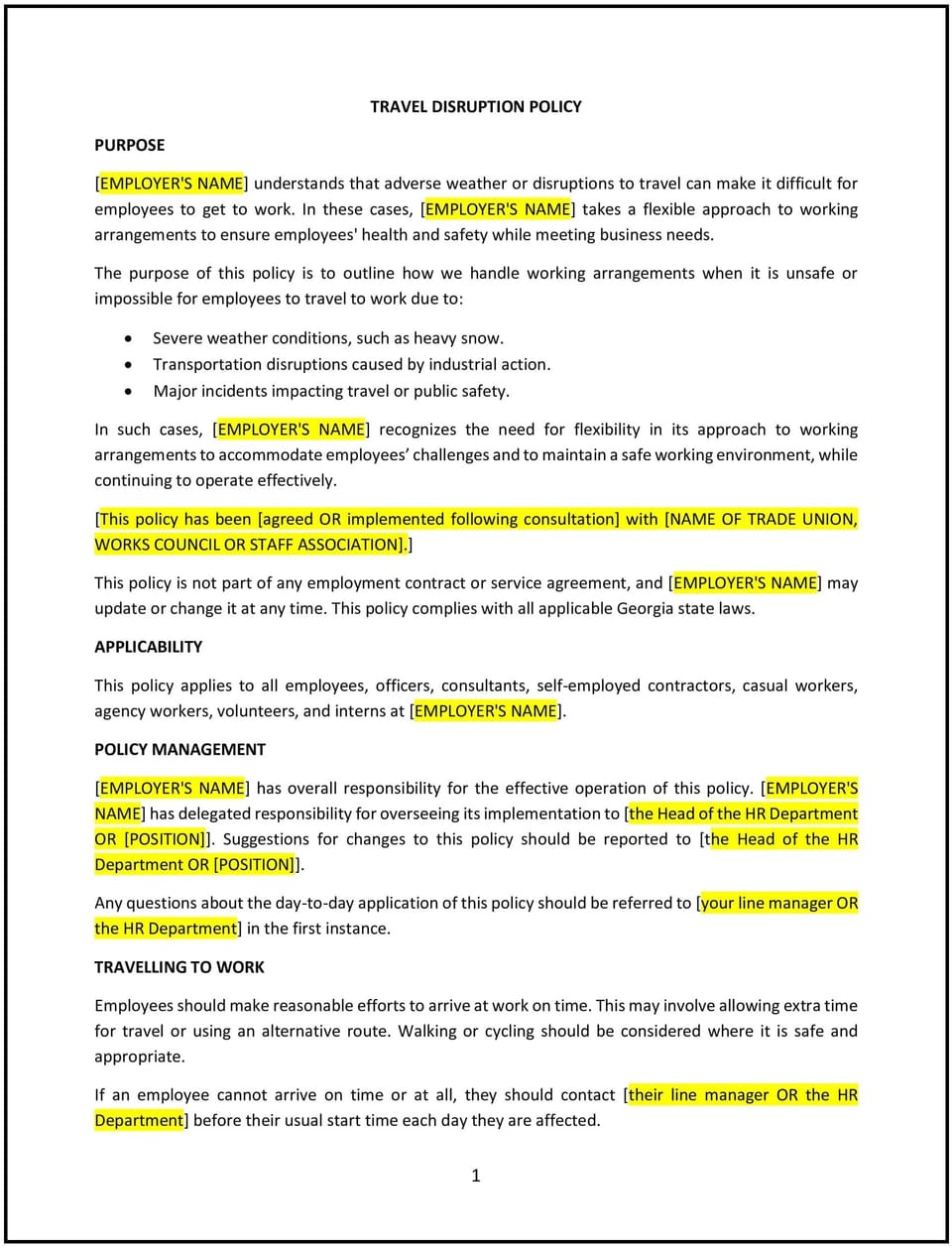Travel disruption policy (Georgia): Free template

Travel disruption policy (Georgia)
This travel disruption policy is designed to help Georgia businesses provide guidance to employees when unexpected issues arise during work-related travel. The policy outlines procedures for handling delays, cancellations, emergencies, and other disruptions to ensure employee safety and minimize the impact on business operations.
By implementing this policy, businesses can support employees effectively during travel disruptions and maintain operational continuity.
How to use this travel disruption policy (Georgia)
- Define travel disruptions: Clearly outline what constitutes a disruption, such as flight cancellations, severe weather, or emergencies.
- Establish communication protocols: Require employees to notify their supervisor or designated contact immediately in the event of a disruption.
- Provide alternative arrangements: Specify how employees should handle rebooking travel, arranging alternate accommodations, or modifying itineraries.
- Address expense guidelines: Clarify how unexpected costs related to disruptions, such as additional lodging or meals, should be managed and reimbursed.
- Ensure employee safety: Encourage employees to prioritize their safety and provide instructions for contacting emergency services if needed.
- Create contingency plans: Develop procedures to mitigate the impact of travel disruptions on business objectives, such as remote work options or rescheduling meetings.
- Require documentation: Ask employees to keep records of disruption-related communications, receipts, and expenses for reimbursement.
- Review regularly: Periodically assess the policy to reflect changes in Georgia travel practices, employee feedback, or business needs.
Benefits of using this travel disruption policy (Georgia)
Implementing this policy provides several advantages for Georgia businesses:
- Enhances employee safety: Clear guidelines prioritize the well-being of employees during disruptions.
- Improves flexibility: Procedures for rebooking and alternate arrangements minimize operational delays.
- Reduces stress: Employees feel supported and equipped to handle unexpected travel issues.
- Ensures accountability: Documentation requirements promote transparency and accurate expense management.
- Reflects Georgia-specific practices: Tailoring the policy to local travel trends ensures its relevance and practicality.
Tips for using this travel disruption policy (Georgia)
- Communicate guidelines: Share the policy with employees before they undertake work-related travel.
- Use travel insurance: Encourage the purchase of travel insurance for large trips to cover unexpected costs.
- Maintain updated contacts: Provide employees with a list of emergency contacts and travel support resources.
- Monitor travel risks: Stay informed about potential disruptions, such as weather conditions or transportation strikes, and notify employees proactively.
- Collect feedback: Encourage employees to provide input on the policy’s effectiveness after experiencing disruptions.
Q: What types of disruptions are covered under this policy?
A: Covered disruptions include flight cancellations, delays, severe weather, transportation strikes, or emergencies that impact travel plans.
Q: How should employees report travel disruptions?
A: Employees should notify their supervisor or designated contact immediately, providing details about the disruption and its impact on their itinerary.
Q: What expenses are reimbursable during a travel disruption?
A: Reimbursable expenses may include additional lodging, meals, or rebooking fees incurred as a result of the disruption.
Q: What should employees do if they encounter an emergency during travel?
A: Employees should prioritize their safety, contact emergency services if necessary, and notify their supervisor as soon as possible.
Q: How should businesses handle meetings or deadlines impacted by travel disruptions?
A: Businesses should implement contingency plans, such as rescheduling meetings or enabling remote participation, to minimize disruptions to operations.
Q: Are employees required to keep documentation of disruption-related expenses?
A: Yes, employees should retain receipts, invoices, and other documentation to support reimbursement requests.
Q: How often should this policy be reviewed?
A: The policy should be reviewed annually or as needed to reflect changes in Georgia travel trends, business practices, or employee feedback.
This article contains general legal information and does not contain legal advice. Cobrief is not a law firm or a substitute for an attorney or law firm. The law is complex and changes often. For legal advice, please ask a lawyer.


